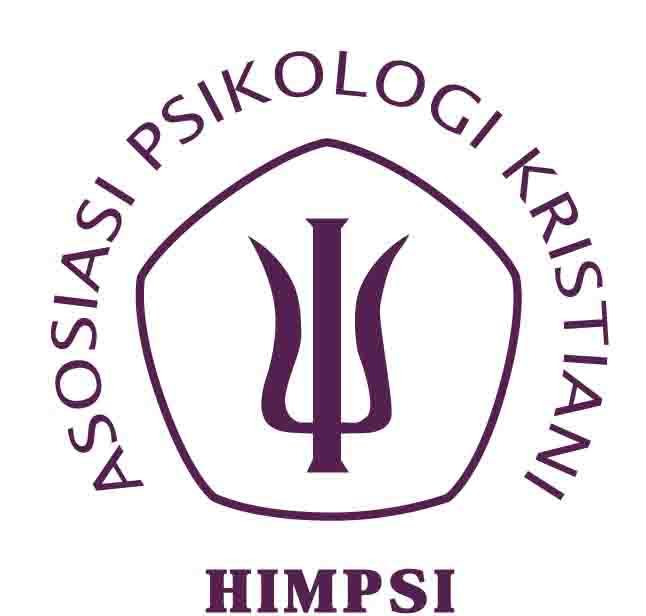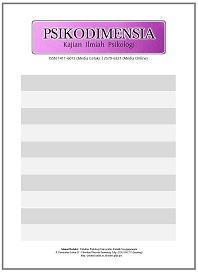Pelatihan Daring untuk Mengurangi Perilaku Prokrastinasi Akademik Selama Pandemi COVID-19 pada Siswa SMP Laki-Laki
Abstract
Salah satu cara untuk menekan laju penularan virus COVID-19 adalah dengan memindahkan kegiatan belajar-mengajar di sekolah menjadi pembelajaran jarak jauh (PJJ). Pemberlakuan PJJ, meski memiliki berbagai keuntungan, namun juga mempengaruhi performa akademik siswa, salah satunya perilaku prokrastinasi. Penelitian ini dilakukan untuk melihat apakah pelatihan daring kelompok berbasis Cognitive Behavior Therapy dapat secara efektif mengurangi perilaku prokrastinasi pada siswa, khususnya siswa SMP laki-laki. Terdapat 4 partisipan (usia 12–14 tahun) yang mengikuti pelatihan ini. Pemilihan partisipan secara accidental sampling, lalu diseleksi yang memiliki skor Irrational Procrastination Scale (IPS) di kategori ’tinggi’ untuk dapat mengikuti pelatihan. Mereka mengikuti 7 sesi pelatihan daring yang setiap sesinya berdurasi 50–70 menit. Penelitian ini adalah penelitian kuantitatif quasi-eksperimen dengan pengambilan data dilakukan pada saat pre-test, post-test, dan follow up (sebulan setelah pelatihan selesai dilakukan). Data kemudian dianalisis menggunakan Friedman’s Test. Hasil penelitian menunjukkan bahwa pelatihan kelompok berbasis CBT daring secara signifikan dapat membantu siswa SMP laki-laki mengurangi perilaku prokrastinasi (ꭓ22= 6,53, p< 0,05).
Keywords
Full Text:
PDF (Bahasa Indonesia)References
Balkıs, M. (2011). Academic efficacy as a mediator and moderator variable in the relationship between academic procrastination and academic achievement. Eurasian Journal of Educational Research, 45, 1-16. Diakses pada 15 Mei 2020 melalui https://ejer.com.tr/academic-efficacy-as-a-mediator-and-moderator-variable-in-the-relationship-between-academic-procrastination-and-academic-achievement/
Beutel ME, Klein EM, Aufenanger S, Brähler E, Dreier M, Müller KW, et al. (2016) Procrastination, Distress and Life Satisfaction across the Age Range – A German Representative Community Study. PLoS ONE 11(2): e0148054. https://doi.org/10.1371/journal.pone.0148054
Corey, M. S., & Corey, G. (1997). Groups: Process and practice. Monterey: Brooks/Cole Publishing Company
Eerde, W., & Klingsieck, K. B. (2018). Overcoming procrastination? A meta-analysis of intervention studies. Educational Research Review, 25, 73-85. https://doi.org/10.1016/j.edurev.2018.09.002
Ferrari, J. R., Keane, S. M., Wolfe, R. N., & Beck, B. L. (1998). The antecedents and consequences of academic excuse-making: Examining individual differences in procrastination. Research in higher education, 39(2), 199-215. https://doi.org/10.1023/A:1018768715586
Grunschel, C., Patrzek, J., & Fries, S. (2013). Exploring reasons and consequences of academic procrastination: An interview study. European Journal of Psychology of Education, 28(3), 841-861. https://doi.org/10.1007/s10212-012-0143-4
Hen, M., & Goroshit, M. (2014). Academic self-efficacy, emotional intelligence, GPA and academic procrastination in higher education. Eurasian Journal of Social Sciences, 2(1), 1-10. Diakses pada tanggal 15 Juni 2021 melalui https://ideas.repec.org/a/ejn/ejssjr/v2y2014i1p1-10.html
Jia, J., Jiang, Q., & Lin, X. H. (2020). Academic anxiety and self-handicapping among medical students during the COVID-19 pandemic: A moderated mediation model. Research Square, 1–22. https://doi.org/10.21203/rs.3.rs-77015/v1
Kaplan, R. M. & Saccuzzo, D.P. (2009). Psychological testing: Principles, applications, and issues. Belmont, CA: Wadsworth Cengage Learning.
Kemendikbud. (2020). Surat edaran mendikbud no 4 tahun 2020 tentang pelaksanaan kebijakan pendidikan dalam masa darurat penyebaran corona virus disease (covid- 1 9). Diakses tanggal 20 Juni 2021 melalui https://pusdiklat.kemdikbud.go.id/surat-edaran-mendikbud-no-4-tahun-2020-tentang-pelaksanaan-kebijakan-pendidikan-dalam-masa-darurat-penyebaran-corona-virus-disease-covid-1-9/
Nunnally & Bernstein, I.H. (1994). Psychometric Theory 3rd ed. New York: McGraw Hill.
Ozer, B. U., Demir, A., & Ferrari, J. R. (2013). Reducing academic procrastination through a group treatment program: A pilot study. Journal of Rational-Emotive & Cognitive-Behavior Therapy, 31(3), 127-135. https://doi.org/10.1007/s10942-013-0165-0
Ozer, B. U., Demir, A., & Ferrari, J. R. (2009). Exploring academic procrastination among Turkish students: Possible gender differences in prevalence and reasons. The Journal of social psychology, 149(2), 241-257. https://doi.org/ 10.3200/SOCP.149.2.241-257
Palmer, D. (1998). Procrastination, McMaster University, Center for Students Development
Prasetyaningtyas, S. (2020). Pelaksanaan Belajar Dari Rumah ( BDR ) secara 11 Online selama Darurat Covid-19 di SMP N 1 Semin. Ideguru: Jurnal Karya Ilmiah Guru, 5(1), 86–94
Prayitno, G. E., Siaputra, I. B., & Lasmono, H. K. (2013). Validasi alat ukur irrational procrastination scale (IPS). Calyptra, 2(1), 1-7.
Rozental, A., Bennett, S., Forsström, D., Ebert, D. D., Shafran, R., Andersson, G., & Carlbring, P. (2018). Targeting procrastination using psychological treatments: A systematic review and meta-analysis. Frontiers in psychology, 9, 1588
Rozental, A., Forsell, E., Svensson, A., Andersson, G., & Carlbring, P. (2015). Internet-based cognitive—behavior therapy for procrastination: A randomized controlled trial. Journal of Consulting and Clinical Psychology, 83(4), 808. https://doi.org/10.1037/ccp0000023.
Saulsman, L., & Nathan, P. (2008). Put Off Procrastinating. Perth, Western Australia: Centre for Clinical Intervention. Diakses pada 10 September 2020 melalui https://www.cci.health.wa.gov.au/Resources/Looking-After-Yourself/Procrastination
Schraw, G., Wadkins, T., & Olafson, L. (2007). Doing the things we do: a grounded theory of academic procrastination. Journal of Educational psychology, 99(1), 12. https://doi.org/10.1037/0022-0663.99.1.12
Stallard, P. (2002). Cognitive behaviour therapy with children and young people: A selective review of key issues. Behavioural and Cognitive Psychotherapy, 30(3), 297–309. https://doi.org/10.1017/S1352465802003053
Steel, P., & Ferrari, J. (2013). Sex, education and procrastination: An epidemiological study of procrastinators’ characteristics from a global sample. European Journal of Personality, 27(1), 51-58. https://doi.org/10.1002/per.1851
Steel, P. (2010). Arousal, avoidant and decisional procrastinators: Do they exist?. Personality and Individual Differences, 48(8), 926-934. https://doi.org/10.1016/j.paid.2010.02.025
Steel, P. (2007). The nature of procrastination: a meta-analytic and theoretical review of quintessential self-regulatory failure. Psychological bulletin, 133(1), 65. https://doi.org/10.1037/0033-2909.133.1.65
Steel, P., & König, C. J. (2006). Integrating theories of motivation. Academy of management review, 31(4), 889-913. https://doi.org/10.2307/20159257
Suhadianto., Arifiana, I. Y., Rahmawati, H., Hanurawan, F., & Eva, N. (2021). Stop Academic Procrastination During Covid 19: Academic Procrastination Reduces Subjective Well-Being. KnE Social Sciences, 4(15), 312–325. https://doi.org/10.18502/kss.v4i15.8220
Wazid, S. W., Shahnawaz, M. G., & Gupta, D. (2016). Procrastination among students: The role of gender, perfectionism and self-esteem. The Indian journal of social work, 77(2), 191-210. Diakses tanggal 21 Juni 2021 melalui https://journals.tiss.edu/ijsw/index.php/ijsw/article/view/6
Ziegler, N., & Opdenakker, M. C. (2018). The development of academic procrastination in first-year secondary education students: The link with metacognitive self-regulation, self-efficacy, and effort regulation. Learning and Individual Differences, 64, 71-82. https://doi.org/10.1016/j.lindif.2018.04.009
DOI: https://doi.org/10.24167/psidim.v21i2.4857
Print ISSN : 1411-6073 | online ISSN : 2579-6321 View My Stats

This work is licensed under a Creative Commons Attribution 4.0 International License.




















